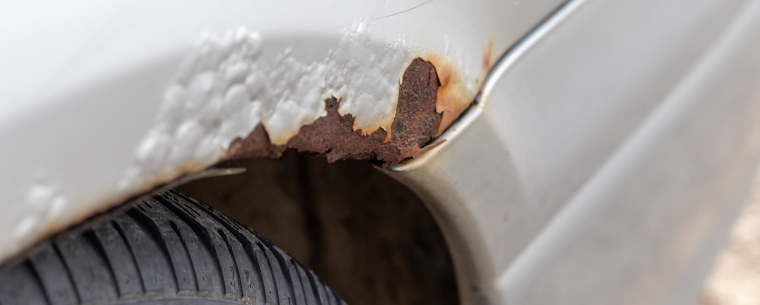How to Prevent Rust on Your Car
Jack Dreyer | Tuesday 8th February 2022 2:30pm

Rust can be something of a silent assassin for a car. While it may look small and fairly insignificant, the damage it can cause can ruin your car’s body panels, and even compromise the structural integrity of your vehicle as a whole.
Prevention is the key when it comes to rust and rust damage. Taking the time to look after your vehicle’s exterior puts you ahead of the issue, and saves you from scrambling to find fixes once you spot the first signs of rust. However, if you are in that position, then there are still a few things you can do to help - read on to find out more.
What causes rust?
Rust develops when iron reacts with oxygen and water, with the reactions appearing as an orangey-brown layer that can lead to corrosion and damage. In the context of a car, this usually happens because of a few different factors:
- Weather – Rain, sleet, and snow all increase the chances of rust appearing on your car. Naturally, this is a higher risk in winter, when even things like the salts used to grit icy roads can speed up the corrosion process.
- Age – Paintwork can suffer from wear and tear more over time, particularly as any protective coatings on the paint naturally wear away. The more that any metalwork is exposed to moisture, the more likely it is that it will eventually rust and corrode.
- Materials – You often find that rust is more common on older models, as older cars were generally made without non-reactive coatings. Newer cars also use arch liners to prevent vulnerable areas like wheel wells.
Where is rust most likely to occur?
If you’re worried about the effects of rust damaging your vehicle, then there are a few handy checks and things you can do to minimise the risk. The best way to deal with rust is to stop it from ever occurring, and if that’s your game plan, it’s a good idea to focus your checks on the major problem areas. These include:
- Under the body mouldings and trim
- Where the side mirrors connect with the car
- Where the antenna joins
- Around the sunroof
- The entire surface under the vehicle
- Wheel wells
Now, that last one is a biggie. Wheel wells are a common trouble spot for rust developing, partly because they’re often neglected from cleaning and maintenance, and because the dirt build-up can mean you don’t spot the rust for a long time.
To keep things clean and tidy, use a torch to thoroughly inspect and clean the inside of your wheel wells. You can do this at the same time as you rotate your tyres, which can be a handy way to schedule it in and stop yourself forgetting.
Spotting rust early
So, now you know what causes rust, and where to look for it to help prevent it from causing damage to your car. But just because you know where to look, do you know what exactly it is that you’re looking for?
The signs of rust can appear in a few different ways. When you’re examining your car for potential rust, look out for the following:
Bubbles
Bubbles under the paint can indicate that water and air have gathered under the surface of the paint - which means that this is likely to become a hotspot for rust in the not-too-distant future.
Water damage
If you spot water damage, or even puddles, inside your car - such as in the footwells or the boot - this is often a sign that the bodywork around that area may have rusted.
Body damage
If you’ve got any damage on the bodywork of your car, like scratches, nicks, or dents, these can be a good place to focus your rust-prevention efforts.
Looking after your car
There are lots of different reasons that your car might have patches of rust. While things like regular washing (with a car wash, not household soap) and regular checks can help you to prevent issues and spot things early, if you’ve already got rust on your car then it’s time to enlist the help of the professionals.
It’s always a good idea to head to a garage and get them to assess how bad the damage is, and whether it can be fixed. If you have any concerns about rust on your car, head to your local Kwik Fit centre and talk to one of our technicians for friendly, helpful advice.
Any facts, figures and prices shown in our blog articles are correct at time of publication.
Featured Articles
Is Your Car Battery Ready for Winter?
Monday 11th November 2024
Is the UK on the verge of ‘the coldest winter for 50 years?’ Even if El Niño doesn't hit the UK this winter, reduce the risk of a winter breakdown by making sure your car battery is winter-ready.
Your Ultimate Winter Driving Checklist
Monday 31st October 2022
Driving in the colder months presents many challenges. Breakdowns are far more common in winter, so make sure you’re prepared with these essentials.
How to Get Your Car Ready for Winter
Wednesday 28th September 2022
Winter can be a harsh season for your car but planning ahead by carrying out some basic maintenance and packing some essential kit should help you avoid a winter breakdown.







